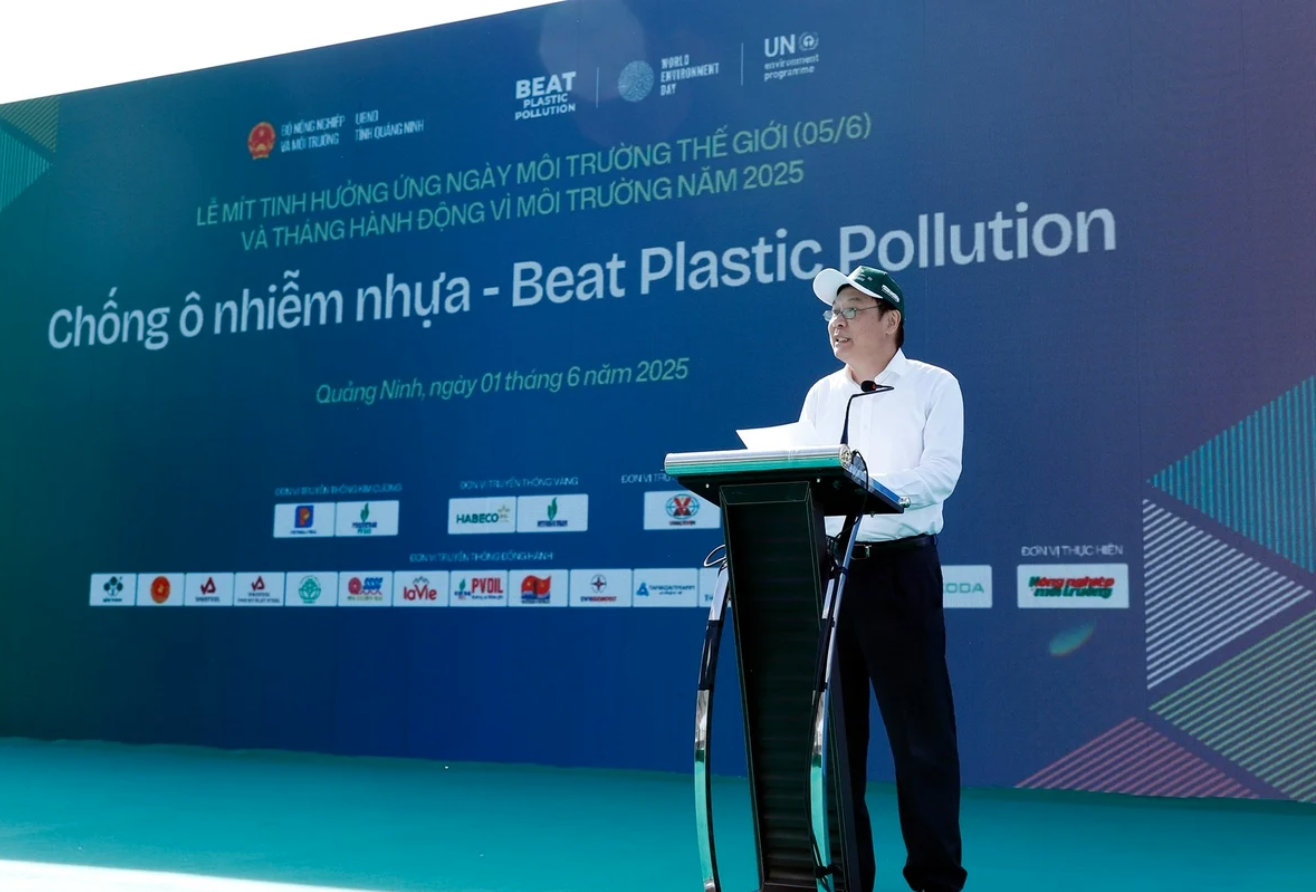Plastic pollution is no longer a problem confined to any one country but has become a global threat requiring urgent and coordinated action.
The message was made by Deputy Minister of Agriculture and Environment Le Cong Thanh at the meeting held on the morning of June 1 in Ha Long, Quang Ninh to celebrate World Environment Day (June 5) and the Month of Action for the Environment 2025.
The event was a call to transform awareness into tangible action - by every household, community, and organization - toward a cleaner, greener Vietnam that lives in greater harmony with nature.
With the theme “Beat Plastic Pollution,” this year’s World Environment Day sounds a stern alarm about one of the most significant environmental challenges of the 21st century.
 Deputy Minister Le Cong Thanh gave opening remark at the ceremony. Photo: Khuong Trung.
Deputy Minister Le Cong Thanh gave opening remark at the ceremony. Photo: Khuong Trung. Coordinated action to tackle the plastic crisis
In its efforts to reduce plastic pollution, Vietnam has enacted and implemented a series of important policies, including the 2020 Environmental Protection Law and the National Action Plan on Ocean Plastic Waste. The latter sets the goal of reducing marine plastic waste by 75% by 2030, eliminating the dumping of fishing gear into the ocean, and phasing out single-use plastics at tourist sites and marine protected areas.
At the local level, many initiatives are being vigorously rolled out. Quang Ninh, Hai Phong, Da Nang, Ho Chi Minh City, Binh Duong, and others have promoted models such as “green wet markets,” “plastic waste-free cities,” and “waste sorting at source.” Many businesses are also shifting to biodegradable materials, recycled packaging, and circular economy practices in production.
Notably in Quang Ninh, programs like “Plastic Waste-Free Ha Long Bay” and “Plastic-Free Co To” have achieved remarkable results, with more than 98% of styrofoam buoys replaced by HDPE plastic ones, significantly contributing to the protection of marine ecosystems.
However, according to Deputy Minister Le Cong Thanh, these efforts still face many challenges. While a legal framework has been established, implementation remains limited. Waste sorting at source is inconsistent, many businesses hesitate to invest in green technologies due to high costs, and single-use plastic remains a common habit in the community.
“Plastic pollution is not just an environmental issue, it is a litmus test for Vietnam’s adaptability in transitioning to a circular and knowledge-based economy,” he emphasized. According to him, advanced technology, innovation, and close cooperation between the government, businesses, and citizens will turn challenges into momentum for sustainable development.
“We call on all levels of government, the business community, and every individual to take action. Don’t disregard plastic pollution. Let’s build a green lifestyle - for the Environment today and for future generations,” the Deputy Minister stated at the event.
Systemic solutions begin with small actions
Also speaking at the event, Mr. Van Ngoc Thinh, Country Director of WWF Vietnam, warned that over 11 million tons of plastic are dumped into the ocean yearly—a figure that is no longer a prediction but a daily reality, silently destroying marine ecosystems.
Plastic waste is not just garbage; it is the first link in a chain of negative impacts: biodiversity loss, disrupted livelihoods, and escalating cleanup costs. With a coastline stretching over 3,200 kilometers and an economy heavily reliant on the sea, Vietnam cannot stand outside this circle of impact.
As such, anyone can join the fight against plastic pollution—starting with small actions like refusing single-use plastics and choosing more sustainable products.
“The story of a plastic bag used for a few minutes but lasting hundreds of years is not new, but there is still no definitive solution because consumer behavior has not changed,” Mr. Thinh emphasized.
He said that information must be communicated smartly to change behavior, helping communities see the economic benefits of environmentally friendly choices. From small actions, a broader system of solutions—such as waste sorting at source, already stipulated by law—can gradually take shape, though implementation remains limited.
WWF Vietnam is currently rolling out several projects in Con Dao, Phu Quoc, and other areas based on the principle that local governments must be actively involved.
Regarding policy, Mr. Thinh praised efforts such as the Environmental Protection Law and mechanisms promoting a circular economy. However, to make these policies truly effective, complete data, transparent monitoring systems, and a legal environment conducive to testing recycling and reuse models are needed.
For businesses, Mr. Thinh highlighted that Extended Producer Responsibility (EPR) is a vital tool in shifting the economy away from its “plastic addiction,” but EPR alone is not enough. He proposed additional targeted support policies to incentivize companies to invest systematically in anti-plastic pollution solutions.